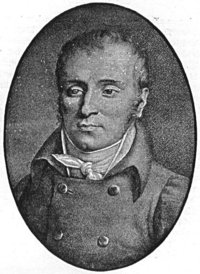|
|
Marie François Xavier Bichat (November 14, 1771 - July 22 1802), French anatomist and physiologist, was born at Thoirette (Jura).
Bichat is best remembered as the father of modern histology and pathology. Despite the fact that he worked without a microscope he was able to advance a great deal understanding of human body. He was the first to introduce the notion of tissu (tissues) as distinct entities. He maintained that diseases attacked tissues rather than whole organs.
His father, a physician, was his first instructor. He entered the college of Nantua, and afterwards studied at Lyons. In mathematics and the physical sciences he made rapid progress, but ultimately devoted himself to the study of anatomy and surgery, under the guidance of M. A. Petit (1766-1811), chief surgeon to the Hotel Dieu at Lyons.
The revolutionary disturbances compelled him to fly from Lyous and take refuge in Paris in 1793. He there became a pupil of P. J. Desault, who was so strongly impressed with his genius that he took him into his house and treated him as his adopted son. For two years he actively participated in all the labors of Desault, prosecuting at the same time his own researches in anatomy and physiology.
The sudden death of Desault in 1795 was a severe blow to Bichat. His first care was to acquit himself of the obligations he owed his benefactor, by contributing to the support of his widow and her son, and by conducting to a close the fourth volume of Desault's Journal de Chirurgie, to which he added a biographical memoir of its author.
His next object was to reunite and digest in one body the surgical doctrines which Desault had published in various periodical works. Of these he composed, Euvres chirurgicales de Desault, ou tableau de sa doctrine, et de sa pratique dens le traitement des maladies externes (1798-1799), a work in which, although he professes only to set forth the ideas of another, he develops them with the clearness of one who is a master of the subject. In 1797 be began a course of anatomical demonstrations, and his success encouraged him to extend the plan of his lectures, and boldly to announce a course of operative surgery.
In the following year, 1798, he gave in addition a separate course of physiology. A dangerous attack of haemoptysis interrupted his labors for a time; but the danger was no sooner past than he plunged into new engagements with the same ardour as before. He had now scope in his physiological lectures for a fuller exposition of his original views on the animal economy, which excited much attention in the medical schools at Paris.
Sketches of these doctrines were given by him in three papers contained in the "Memoirs of the Socit Medicale d'Emulation", which he founded in 1796, and they were afterwards more fully developed in his TraiAf sur les membranes (1800). His next publication was the "Recherches physiologiques sur la vie et sur a snort" (1800), and it was quickly followed by his Anatomic generatic (1800), the work which contains the fruits of his-most profound and original researches. He began another work, under the title Anatomic descriptive (1801-1803), in which the organs were arranged according to his peculiar classification of their functions, but lived to publish only the first two volumes.ru:Биша, Мари Франсуа Ксавье

